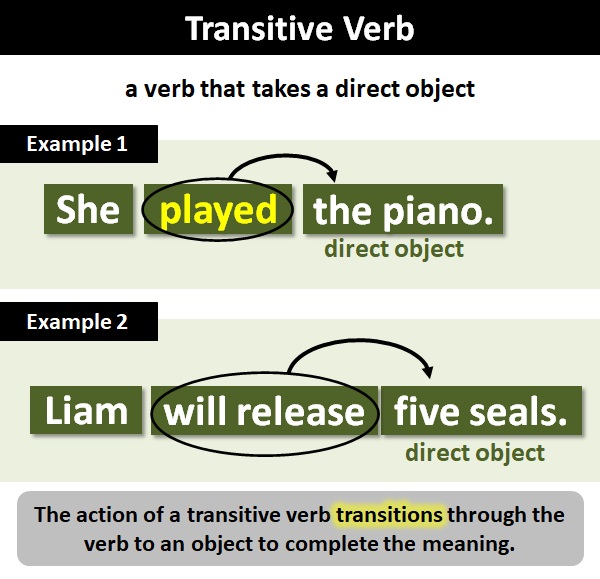ref – https://www.grammar-monster.com/glossary/transitive_verbs.htm
What Are Transitive Verbs?
A transitive verb is a verb that takes a direct object.
In other words, it is a verb that acts on something.
For example:
The dog ate the bone.
The verb “ate” is a transitive verb. It acts on “the bone,” which is the direct object of “ate.”
I am singing a song.
The verb “am singing” is a transitive verb. It acts on “a song,” which is the direct object of “am singing.”

More Examples
Lee eats pies.
(Eats is transitive because you can eat something.)
Lee loves mince pies.
(Loves is transitive because you can love something. Note that direct objects aren’t usually single words. They’re usually noun phrases, i.e., more than one word.)
Lee bought dozens of cakes.
(Bought is transitive because you can buy something.)
All the toys opened their eyes as the clock struck midnight.
(Q: Opened what? A: their eyes)
(Q: Struck what? A: midnight)
(If it answers the question “what?” or “whom?” in relation to a verb, then it’s a direct object. Midnight is a noun, it’s a perfectly good direct object for the verb to strike.)
No amount of time can erase the memory of a good cat, and no amount of masking tape can ever totally remove his fur from your couch.
You can’t get eight cats to pull a sled through snow.
I loathe people who keep dogs. They are cowards who haven’t got the guts to bite people themselves.
(Q: Loathe what? A: people who keep dogs)
(Q: Haven’t got what? A: the guts to bite people)
(If you look at just the two direct objects in this example (i.e., the texts in bold),
there’s a transitive verb in each one.
“people who keep dogs”
Q: Keep what? A: dogs
“the guts to bite people”
Q: To bite what? A: people)
What Does “Transitive” Mean?
A transitive verb gets its name from the idea that the action must transition through it to an object in order to complete the meaning.
Lee (subj) caught (verb). X(incomplete)
(When the action does not transition through the verb to an object, the meaning is incomplete.)
Lee (subj) caught (verb) a whelk (obj). √
She gave the waiter a smile.
(Here, a smile is the direct object (it answers “gave what?”), and the waiter is the indirect object (it answers “for whom?”).)
It doesn’t happen too often, but sometimes a transitive verb works with just an indirect object.
He paid her.
(This is a transitive verb without a direct object. The meaning is still complete because the action transitions through the verb to an indirect object.)